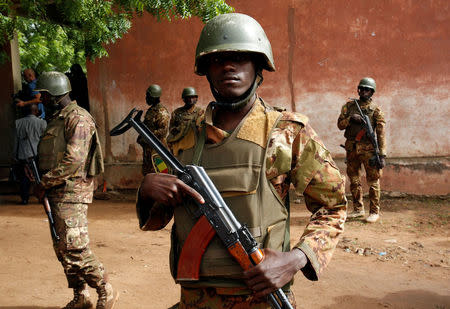Armed attacks disrupted vote in a fifth of Malian polling stations

By Tim Cocks and Maimouna Moro
BAMAKO/TIMBUKTU (Reuters) - Attacks by gunmen or other violence disrupted around a fifth of Mali's polling stations during Sunday's presidential election, with about three percent unable to function at all, the Ministry of Territorial Administration said on Monday.
Of the roughly 23,000 polling stations that were meant to open, 4,632 were disrupted by "armed attacks or other violence", of which 644 were unable to operate, ministry figures showed.
Spiralling jihadist violence has become a key issue in the campaign of several opposition candidates competing with President Ibrahim Boubacar Keita, as attacks multiply and the death toll mounts across north and central Mali.
Al Qaeda's franchise in the Sahara claimed a mortar attack on the town of Aguelhok in the northern region of Kidal during the election.
In that assault, militants fired 10 mortar rounds, one of which exploded about 100 metres (yards) from a polling station, causing voting to be temporarily suspended.
In most of Mali, the vote was peaceful and relatively well-organised, with polls opening and closing on time. Most people who were enrolled and turned up were able to vote.
But the number of disenfranchised voters, even if small, could become a flashpoint if the result is very close. Counting is under way but results may not come out for another day or even longer. Candidates are forbidden from making announcements before the official tally is collated centrally in Bamako.
The party of Keita's main challenger Soumaila Cisse had already complained about voting being disrupted and pressed the government to release a list of the places that had problems.
TIMBUKTU BLUES
In the mud-walled medieval city of Timbuktu, once a flourishing tourist spot before Islamist militants made it too dangerous, witnesses said that gunmen had intimidated voters, seized ballot boxes and in some cases set fire to them in the few polling stations that were attacked outside town.
"They came, they fired their weapons and then they took the ballot boxes away," witness and Timbuktu resident Insubdar Inaboud, 42, a bus conductor, told Reuters. He would have voted for Cisse, who hails from the region, if he'd had the chance. "I'm so angry. I don't think this vote is valid, because we are also Malians."
Islamist militants took over northern cities like Timbuktu in 2012 on the back of a Tuareg rebellion, imposing Sharia law with harsh penalties like cutting off fingers for smoking, until France intervened a year later to push them back. They regard democracy as an un-Islamic Western imposition.
But since Keita, known by his initials "IBK", came to power in the 2013 poll, Islamist violence has swept south into Mali's fertile centre. The U.N. mission chief Mahamat Saleh Annadif on Friday urged whoever wins the poll to urgently address jihadist-stoked ethnic violence in Mali's central "breadbasket".
The figures from the ministry showed that the troubled central region of Mopti accounted for roughly half of polling stations under attack.
Hamid Bore, 39, a teacher, was in charge of one such station in the village of Dembere. The militants arrived on time, just as polls opened at 8 a.m.(0800 GMT), he said.
"They were firing shots and then they asked for the bureau chief," he told Reuters by telephone. "They beat us up, then stole the ballot boxes and our bikes. I had to walk back. This is our only means of travel. How am I going to survive now?"
At a news conference, the head of the European Union observer mission welcomed the government's decision to make public the number of polling stations that had not been able to function but urged it to publish more precise information about which ones exactly.
"The lists published by the government do not identify the polling stations precisely as we asked them to do," mission chief Cecile Kyenge said.
"This makes the work of observing and gathering information more difficult. This is a start but it needs to be completed in a precise and rigorous manner," she said.
(Additional reporting by Maita Moro in Timbuktu, Marina Depetris and Tiemoko Diallo in Bamako, Editing by Aaron Ross, William Maclean)

